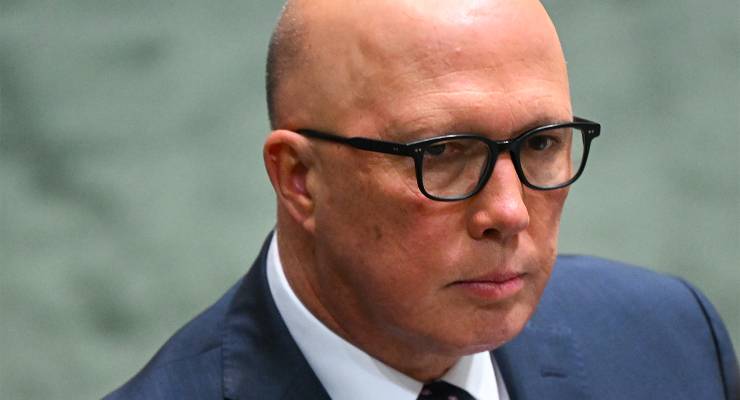
Opposition Leader Peter Dutton’s contention that Rio Tinto is hypocritical for supporting the Yes vote for the Voice to Parliament after blowing up irreplaceable cultural treasures at Juukan Gorge might well be one that rings true to a lot of Voice advocates — not to mention other No vote advocates who otherwise would rather drink a bucket of sand than agree with him.
After BHP, Rio Tinto and Wesfarmers each donated $2 million to the Yes23 campaign, and tens of thousands of people showed up to pro-Voice rallies over the weekend, Dutton told Sky News that big pro-Voice companies “lacked a significant backbone” on the referendum, “craving popularity” and taking their cues from Twitter: “Frankly, a lot of business leaders in our country today need to reassess where they are on some of these debates.”
But why should we be surprised? Dutton kicked off his party leadership by making it clear that big business was no longer at the core of his party’s decision-making: “I think the Liberal Party in recent years has become quite estranged from big business and I want to focus on small business.”
Let’s take a look at how that holds up.
On donations, there has been no discernible falling out between big business and the Liberal Party. It has received millions of dollars from fossil fuel giants, big banks, the big four consultants, gambling and alcohol companies and other corporate behemoths in recent years. At the time of writing, Dutton has made no public plans to hand any of it back.
And his rhetoric on Labor’s proposed industrial relations changes — an attempt to crack down on sham contracting and use of the “gig economy” to avoid employment entitlements — can’t have upset big business too much.
“The government said it would support workers and that it would work to support all Australians — instead it will sacrifice them at the altar of unionism,” he told Parliament last November. “In its current form, it will impose the most radical changes on Australia’s industrial relations system in decades, changes which will complicate the system, create conflict in workplaces and cause delays.”
All the major employer representative groups, such as the Business Council of Australia, the Australian Industry Group and the Minerals Council of Australia, have come out vehemently against the changes.
Perhaps it’s on tax policy that this estrangement makes itself most apparent. Well, not if Dutton’s address to the Australian Petroleum Production and Exploration Association conference in May is anything to go by. He warned oil and gas industry representatives that Labor wanted to hit them “with the hammer of taxation” and promised his party “will fight for your sector”.
There was a slight lapse in Dutton’s fury at business getting involved in political campaigns, urging the sector to fight for itself. This is to say nothing of Dutton’s voting history.
On marriage equality, we finally see some evidence of the growing distance between the corporate world and Dutton, who memorably told Qantas CEO Alan Joyce to “stick to your knitting” over Joyce’s planned campaign in favour of a Yes vote. He also, immortally, chided the NRL for not making the effort to find one of those many highly popular and definitely real songs defending traditional marriage from the threat of same-sex marriage that absolutely exist after it booked Macklemore (of “Same Love” fame) to play the grand final in 2017.
So that, and the Voice, appear to be the only actual points of difference between Dutton and big business. On the face of it, you’d say it he wants the credit for his attacks on big business for using the wrong language, without any interest in the material conditions that make them so powerful. Typical virtue signalling.








Dutton just doesn’t have that much to say as he and his party have consistently dealt themselves out of any meaningful policy debate, so has to create confected outrage to remain relevant.
When he does say something, he either uses undigested talking points from some US lobbyist, or quotes a former LNP leader out of context.
Dutton biting the hand that feeds him when it gives food to someone else.
The Liberals rarely come out explicitly in favour of big business, that would be far too obvious. Likewise big business bodies in their own propaganda. Always the rhetoric is about protecting or promoting “business” and the references and examples used are invariably “small business”. A reference that conveniently covers a corner store and a business with 100 workers and revenue up to $50 million pa. These examples serve up the sympathy and empathy while the policy being promoted or opposed gets on with looking after big business. In many cases helping big business further screw small business.
He managed to navigate around or ignore several big businesses or public companies in mining & fossil fuels, who presumably do not support the Voice campaign?
Allegedly, a controlling shareholder of a mining company follows the US Koch climate science denial and ‘segregation economics’ promoted via lobbying of a Melbourne based ‘institute’ (for the top end of town), then mainstreamed by media over past decades; interestingly the same person appeared to be using a relationship with the Nats leadership in the past, to wedge in their own Liberal colleagues round climate science, fossil fuels etc.. (classic GOP tactic)
Too easy….
Where does the Liberal (and National) Party find these grubs?
Don’t they have some sort of filtering process?
… A party of John West rejects.
They probably do – and if this is what gets through it, imagine what has been rejected.
As has been pointed out in the past, R G Menzies would today be rejected. Turnbull was tried and found wanting. Archer, Leeser – unsatisfactory and barely tolerated. Gee saw the light and resigned in time.
An attempt to confect a Ron de Santis anti-woke culture war with Big Business.
Dutton should be more worried by the Teal voters he is alienating by opposing the Voice.